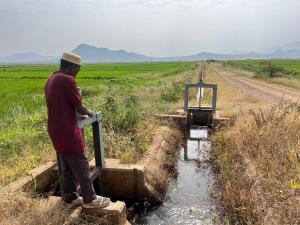Test project Pesticides and Protection Tanzania
testing out building a project
pece_annotation_1473109654
josh.correiraThe author is Sonja D. Schmid who is a professor of Science and Technology in Society at Virginia Tech. Her area of expertise is the social aspect of science and technology, esp. during the Cold War, as well as science and technology policy, science and democracy, qualitative studies of risk, energy policy, and nuclear emergency response. As a professor and researcher she has does relevant studies on Fukushima and nuclear disasters relevant to the DSTS network. One such article titled "The unbearable ambiguity of knowing: making sense of Fukushima" is cited below:
Schmid, Sonja D. "The Unbearable Ambiguity of Knowing: Making Sense of Fukushima." Bulletin of the Atomic Scientists. N.p., 2013. Web.
pece_annotation_1477253797
jaostranderEmily Goldmann, PhD, MPH is a current assistant research professor at NYU College of Global Public Health. Goldmann researches environmental and social determinants of mental health conditions. and has focused on surveillance of psychological distress, serious mental illness, and psychiatric hospitalization of New Yorkers following Hurricane Sandy.
Sandro Galea, MD, MPH is a canadian/american board-certified emergency physician. Dr. Galea is currently the Dean of BU School of Public Health and former Chair of the Department of Epidemiology of Columbia University's Mailman School of Global Public Health. He specifically researches social production of health within urban populations, and especially notes psychological and mental health disorder prevalence within vulnerable populations, including mood-anxiety disorders and substance abuse.
pece_annotation_1473112332
josh.correiraI have not found any opinions in the news about the program but several other educational institutions have released announcements about the program appearing to be advertisements.
pece_annotation_1478459208
jaostranderUnited States Marine Master Sergeant Jerry Ensminger lived with his family on Marine Base Lejeune in North Carolina after returning from the Vietnam War in the 1970s. His daughter was diagnosed and died from leukemia. The film follows Sergeant Ensminger on his journey to find justice for his daughter and others affected by chemicals in the bases potable water from 1959-1985. The United States Marine Corp hid reports of carcinogens and other toxic chemicals that had polluted the bases water. The film also investigates the pollution of water from other military bases.
pece_annotation_1473634206
josh.correiraThe data for this report was obtained over a period from the earthquake in 2010 to 2012.
pece_annotation_1478542024
jaostranderInformation for this article was gathered from field work, including interviews with workers at the chernobyl site during the inial response efforts and in the recovery efforts undertaken in the aftermath, as well as effected citizens. This tells us that the author did extensive research for this article and looked to others for opinions and information.
pece_annotation_1474515346
josh.correiraOne major point outlined in the article is the way that disease outbreaks have been viewed and prepared for has changed over the past few centuries. It started out in the view of public health where social factors like sanitation and clean water were valued but then shifted towards preparedness after outbreaks of various influenza viruses seemed to not fit the paradigm of public health.



the rice irrigation scheme, Pare Valley, Tanzania